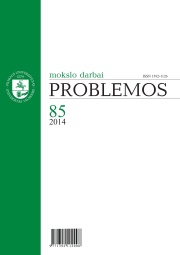REDUKTYVIZMO RAIŠKA ŠIUOLAIKINĖJE ANALITINĖJE FILOSOFIJOJE
REDUCTIONISM IN CONTEMPORARY ANALYTICAL PHILOSOPHY
Author(s): Vytautas Grenda, Vilius Dranseika, Ieva Vasilionytė, Jonas DagysSubject(s): Philosophy
Published by: Vilniaus Universiteto Leidykla
Keywords: reductionism; analytical philosophy; conceptual reduction; ontological reduction.
Summary/Abstract: The aim of this paper is to provide a general account of the forms of reductionism in contemporary analytical philosophy of mind, morality, action and causation, and also to evaluate the similarities and differences of reductionist strategies in these fields. We discuss six reductionist strategies – reduction based on synonymy of terms, the thesis of a posteriori identity, analytical functionalism, anomalous monism, analysis invoking the concept of supervenience, and conceptual analysis without synonymy – and maintain that these strategies have different manifestations in different areas of philosophy, and so they are prone to different criticisms and interpretations. In this paper we attempt to provide an explanation for some of those differences, and also conclude that speaking of reductionism in general in contemporary analytical philosophy, as a phenomenon encompassing all fields, based on a single unifying model or vision of reduction, is not viable.
Journal: Problemos
- Issue Year: 2014
- Issue No: 85
- Page Range: 141-152
- Page Count: 12
- Language: Lithuanian

